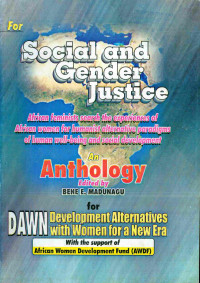
Text
For Social and gender justice
Year 1 of this research programme used a capabilities and entitlements framework to examine the obstacles that adolescent girls in four countries face in fulfilling their full human development potential. Set in the context of a review of the national literature, this resulted in a detailed overview of the different dimensions of deprivation – and, in some cases, rights fulfilment – that girls in the research communities experienced. The framework delineated the following capability domains: educational; economic; physical integrity (including physical health, freedom from violence and sexual and reproductive health); psychosocial wellbeing; managing and benefiting from intra-household relationships; and civic or political participation. While different countries focused on different aspects of these issues, and divided up the capability domains in slightly different ways, all studies sought to illuminate adolescent girls’ perspectives across a broader range of dimensions than are typically studied in current research and policy development (frequently only early marriage, sexual and reproductive health and education are studied; mostly in isolation from one another). The Year 1 fieldwork concentrated on mapping fulfilment and deprivation in capabilities across capability domains, and on identifying key social norms that facilitate or hinder adolescent girls’ capability development. It examined how far opportunities for capability development have changed across recent generations, and generated some insights into how gender norms had changed or might be changing. It further illuminated some of the main factors that mediate girls’ experiences and that help explain the diversity of capability development in contexts with similar social norms, infrastructure, levels of poverty and access to services. In some of the fieldwork sites, the importance of more individual factors (e.g. individual attitudes – both of girls and of their family members – and household composition) and girls’ peer networks in influencing opportunities for capability development was clear.
Availability
| KP.II.000210 | KP.II MAD s | My Library | Available |
Detail Information
- Series Title
-
-
- Call Number
-
KP.II MAD s
- Publisher
- Nigeria : Clear Lines Publication., 2003
- Collation
-
xvi, 350p. : ill. ; 21cm.
- Language
-
Indonesia
- ISBN/ISSN
-
9783672002
- Classification
-
INT VII 41
- Content Type
-
-
- Media Type
-
-
- Carrier Type
-
-
- Edition
-
-
- Subject(s)
-
-
- Specific Detail Info
-
-
- Statement of Responsibility
-
-
Other version/related
No other version available
File Attachment
Comments
You must be logged in to post a comment
 Computer Science, Information & General Works
Computer Science, Information & General Works  Philosophy & Psychology
Philosophy & Psychology  Religion
Religion  Social Sciences
Social Sciences  Language
Language  Pure Science
Pure Science  Applied Sciences
Applied Sciences  Art & Recreation
Art & Recreation  Literature
Literature  History & Geography
History & Geography